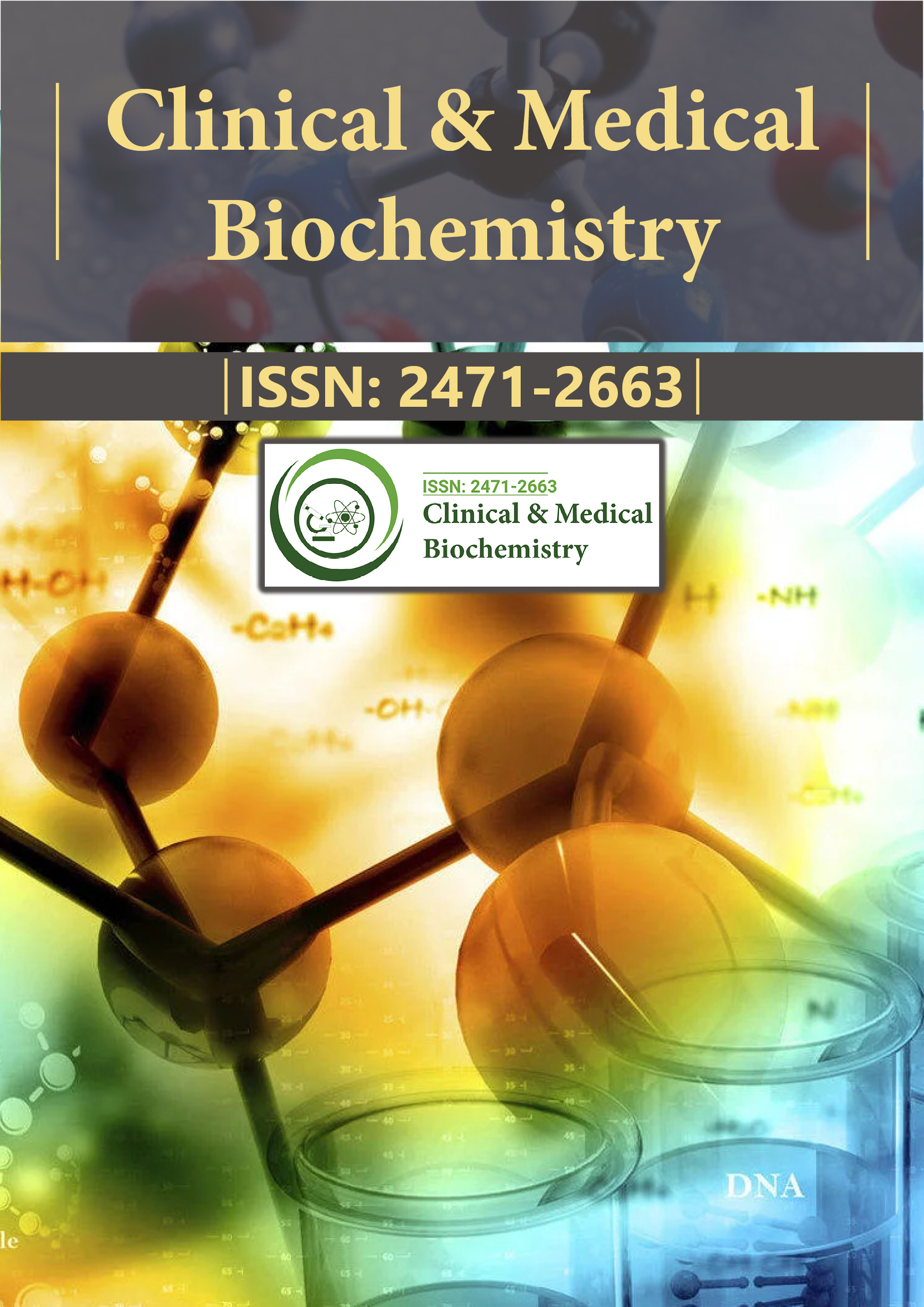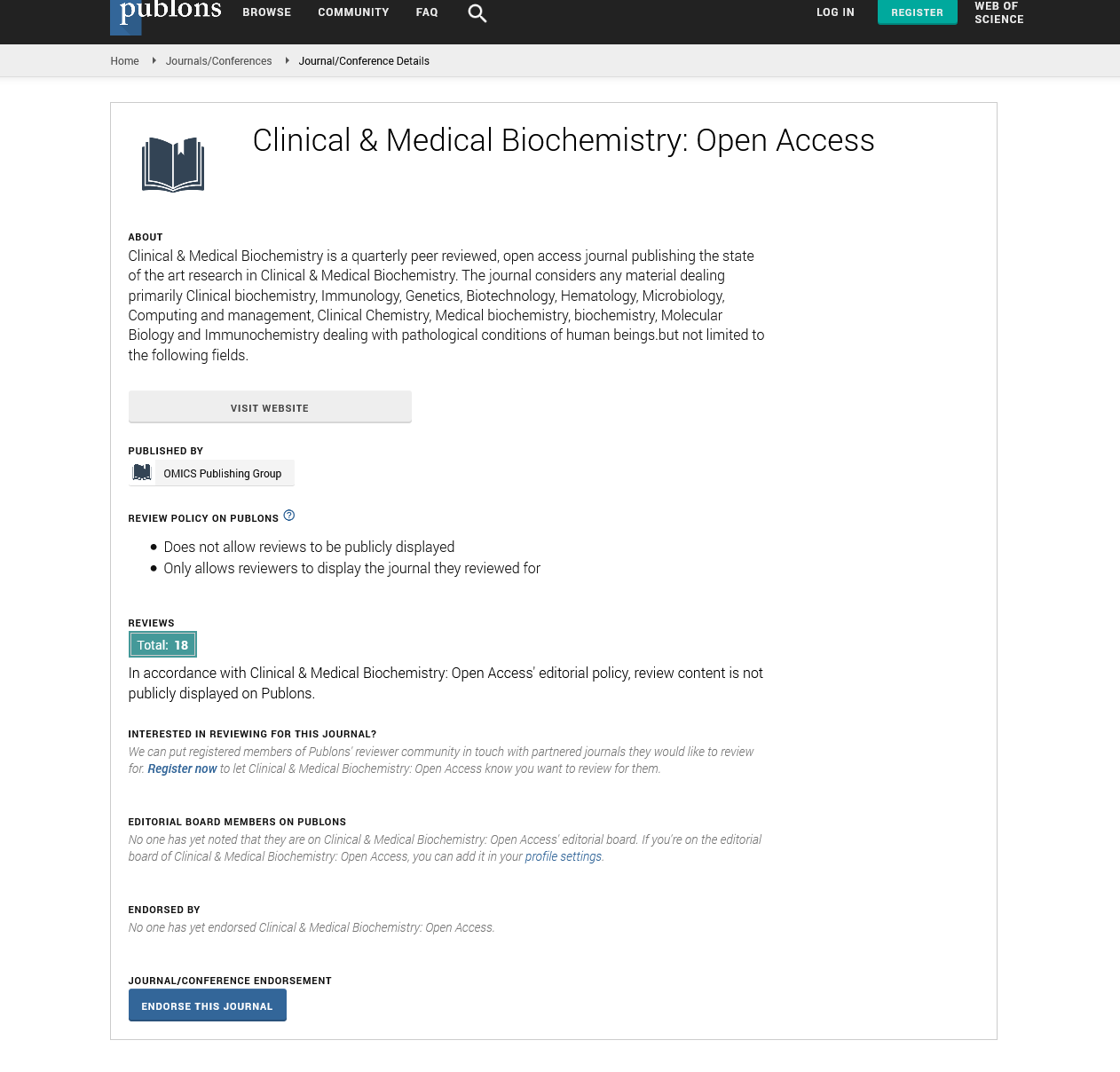Indexed In
- RefSeek
- Directory of Research Journal Indexing (DRJI)
- Hamdard University
- EBSCO A-Z
- OCLC- WorldCat
- Scholarsteer
- Publons
- Euro Pub
- Google Scholar
Useful Links
Share This Page
Journal Flyer

Open Access Journals
- Agri and Aquaculture
- Biochemistry
- Bioinformatics & Systems Biology
- Business & Management
- Chemistry
- Clinical Sciences
- Engineering
- Food & Nutrition
- General Science
- Genetics & Molecular Biology
- Immunology & Microbiology
- Medical Sciences
- Neuroscience & Psychology
- Nursing & Health Care
- Pharmaceutical Sciences
Opinion Article - (2025) Volume 11, Issue 1
Clinical Chemistry: The Cornerstone of Modern Diagnostic Medicine
Akkeeran Mathivanan*Received: 26-Feb-2025, Manuscript No. CMBO-25-29231; Editor assigned: 28-Feb-2025, Pre QC No. CMBO-25-29231; Reviewed: 14-Mar-2025, QC No. CMBO-25-29231; Revised: 21-Mar-2025, Manuscript No. CMBO-25-29231; Published: 28-Mar-2025, DOI: 10.35841/2471-2663.25.11.242
Description
Clinical chemistry, also known as chemical pathology, is a vital branch of laboratory medicine that focuses on the analysis of bodily fluids, primarily blood and urine, to diagnose, treat and monitor diseases. By measuring the concentration of various chemical substances and analytes, clinical chemistry provides crucial insights into the physiological and pathological state of patients. It plays a key role in modern healthcare, allowing for early detection of diseases, guiding therapy decisions and tracking the progress of treatment.
The foundation of clinical chemistry lies in the quantitative and qualitative analysis of biological samples to evaluate organ function and detect abnormalities. These tests range from basic metabolic panels to complex hormone and drug assays. Some of the most common parameters measured include glucose, electrolytes, enzymes, hormones, proteins and waste products like urea and creatinine. Each of these substances provides essential information about the functioning of organs such as the liver, kidneys, heart and endocrine glands.
One of the most frequently requested tests in clinical chemistry is the blood glucose test. Monitoring blood glucose levels is essential in the diagnosis and management of diabetes mellitus, a chronic condition characterized by abnormal carbohydrate metabolism. Consistently high glucose levels can lead to complications such as cardiovascular disease, kidney failure and nerve damage. Clinical chemistry laboratories use automated analyzers to provide rapid and accurate glucose measurements, helping clinicians make informed decisions about patient care.
Electrolyte analysis is another critical component of clinical chemistry. Sodium, potassium, chloride and bicarbonate are measured to assess fluid and acid-base balance. Imbalances in these electrolytes can indicate conditions such as dehydration, kidney dysfunction, heart failure or respiratory disorders. Timely detection and correction of these imbalances are essential for maintaining normal cellular function and preventing life-threatening complications.
Liver function tests, which include the measurement of enzymes like Alanine Aminotransferase (ALT), Aspartate Aminotransferase (AST), Alkaline Phosphatase (ALP) and bilirubin, help assess liver health. Elevated enzyme levels may indicate liver inflammation, hepatitis, or bile duct obstruction. Similarly, renal function tests measure Blood Urea Nitrogen (BUN) and creatinine to evaluate how effectively the kidneys are filtering waste products. These tests are crucial in the diagnosis and monitoring of acute and chronic kidney diseases.
Cardiac markers such as troponin, creatine kinase-MB and B-type Natriuretic Peptide (BNP) are used to detect and monitor heart disease. Elevated troponin levels, for example, are indicative of myocardial infarction or heart attack. These markers are especially important in emergency settings where rapid diagnosis can be the difference between life and death. Clinical chemistry enables fast and accurate detection, ensuring prompt treatment.
Hormonal assays are also a significant area within clinical chemistry. Thyroid function tests, including measurements of Thyroid-Stimulating Hormone (TSH), T3 and T4, are used to diagnose hypothyroidism and hyperthyroidism. Reproductive hormones such as estrogen, progesterone, testosterone, Luteinizing Hormone (LH) and Follicle-Stimulating Hormone (FSH) provide information about fertility, menstrual health and puberty. Cortisol and Adrenocorticotropic Hormone (ACTH) levels help diagnose adrenal disorders like Addison’s disease and Cushing’s syndrome.
In the context of protein analysis, tests like serum albumin, total protein and immunoglobulins give insight into nutritional status, immune function and chronic disease. Abnormal levels may suggest liver disease, kidney disorders, or autoimmune conditions. Clinical chemistry laboratories also perform electrophoresis to separate and identify different types of proteins, which is essential in diagnosing diseases such as multiple myeloma.
Toxicology and therapeutic drug monitoring are additional functions of clinical chemistry. These involve measuring drug concentrations in blood to ensure they are within therapeutic ranges. Overdoses and underdoses can both have serious consequences. Monitoring drugs like anticonvulsants, antibiotics, immunosuppressants and psychiatric medications helps optimize treatment efficacy while minimizing side effects. Clinical chemistry can also detect the presence of drugs of abuse or toxic substances in cases of poisoning or overdose.
Automation has revolutionized clinical chemistry laboratories. Modern analyzers can process hundreds of samples per hour with high accuracy and minimal human intervention. These machines perform multiple tests from a single sample, reducing turnaround time and improving patient care. Quality control systems ensure that results are reliable and consistent across different laboratories. Advances in technology have also enabled the development of Point-Of-Care Testing (POCT), allowing some tests to be performed at the bedside or in clinics and thus speeding up diagnosis and treatment.
Clinical chemistry is not limited to human health. It also has applications in veterinary medicine, forensic science, sports medicine and environmental health. It plays an indispensable role in research, public health surveillance and the development of new diagnostics and therapies.
In conclusion, clinical chemistry is a cornerstone of modern medicine, offering vital information that aids in the diagnosis, monitoring and treatment of a wide range of health conditions. It transforms biological data into actionable medical insights, enabling healthcare professionals to provide targeted and effective care. As technology continues to advance, the scope and precision of clinical chemistry will only expand, further enhancing its role in promoting human health and saving lives.
Citation: Mathivanan A (2025). Clinical Chemistry: The Cornerstone of Modern Diagnostic Medicine. Clin Med Bio Chem. 11:242.
Copyright: © 2025 Mathivanan A. This is an open-access article distributed under the terms of the Creative Commons Attribution License, which permits unrestricted use, distribution and reproduction in any medium, provided the original author and source are credited.

